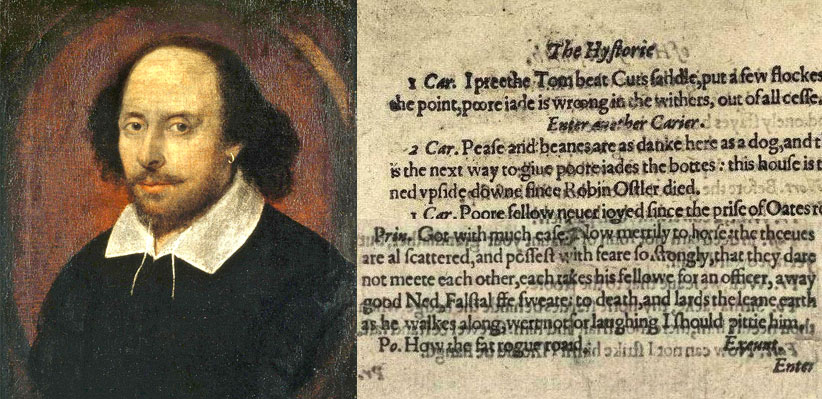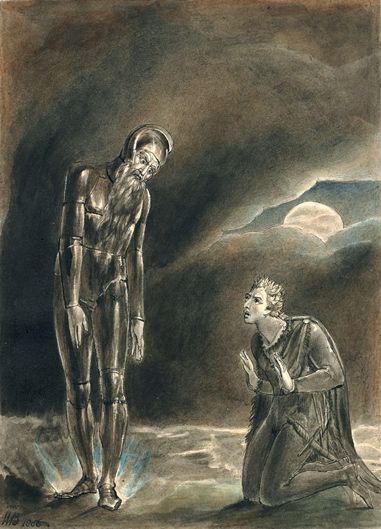 In honor of William Shakespeare we are celebrating the 400th anniversary of his death on April 23, 2016. What better way to do this, than by highlighting the writing done by first-year students in Associate Professor of English John Wesley’s first-year seminar, A Year in the Life of William Shakespeare? This first-year seminar in scholarly inquiry studies four remarkable plays Shakespeare wrote or saw into production in 1599, the same year he opened the Globe Theatre. In the first half of the course, students were introduced to the myriad ways in which Shakespeare’s 1599 plays are shaped by and give shape to the political and cultural intrigues of that year. In the second half of the course, students turned to a play (and year) of their own choosing, the historicist analysis of which is the basis of an independent research project. As part of this project, students were asked to prepare a blog post that reflected on aspects of Shakespeare’s life, a specific work, or a resource or organization associated with Shakespeare, or to provide a personal interpretation of a play. During the month of April, we’ll feature the posts from students that celebrate all things Shakespeare!
In honor of William Shakespeare we are celebrating the 400th anniversary of his death on April 23, 2016. What better way to do this, than by highlighting the writing done by first-year students in Associate Professor of English John Wesley’s first-year seminar, A Year in the Life of William Shakespeare? This first-year seminar in scholarly inquiry studies four remarkable plays Shakespeare wrote or saw into production in 1599, the same year he opened the Globe Theatre. In the first half of the course, students were introduced to the myriad ways in which Shakespeare’s 1599 plays are shaped by and give shape to the political and cultural intrigues of that year. In the second half of the course, students turned to a play (and year) of their own choosing, the historicist analysis of which is the basis of an independent research project. As part of this project, students were asked to prepare a blog post that reflected on aspects of Shakespeare’s life, a specific work, or a resource or organization associated with Shakespeare, or to provide a personal interpretation of a play. During the month of April, we’ll feature the posts from students that celebrate all things Shakespeare!
Congratulations to our wonderful first-year writers. For additional online resources about Shakespeare, check out these sites:
- British Library: http://www.bl.uk/
- Folger Shakespeare Library: http://www.folger.edu/
- Globe Theatre: http://www.shakespearesglobe.com
- Internet Shakespeare Editions: http://internetshakespeare.uvic.ca
- Shakespeare 400: http://www.shakespeare400.org/
Shakespeare and the Supernatural
By Jake Gritzmacher
“He could write realistically in the style of a dispassionate and often amused observer of contemporary life: he could dramatize biographies and historical chronicles; he could invent fairy stories and visionary fantasies; he could create (often out of the most unpromising raw material) huge tragic allegories of good and evil, in which almost superhuman figures live their lives and die their often sickening deaths. He could mingle sublimity with pathos, bitterness with joy and peace and love, intellectual subtlety with delirium and the cryptic utterances of inspired wisdom.” (Aldous Huxley, Shakespeare and Religion)
Present in one form or another in literally every one of Shakespeare’s literary masterpieces is a sense of the supernatural; that is, the consciousness that there is more to life which lies beyond the known world and scientifically-proven aspects of the universe. I, personally, am enthralled with the concept of the mystic, and how in today’s rationalized world of science and technology, humans can still never be sure of how existence began, how or when it will end, and even what on Earth mankind is doing here. I resonate with the manor in which Shakespeare presents supernatural elements in his works, and especially how the way with which he implements them affects his audience’s perception, as well as the overall meaning they derive from the play. This feature of Shakespeare’s work is part of what enticed me into reading and studying his plays in the first place, and is also the facet that incessantly leads me back. Though a majority of the imagery which I am highlighting in this post hails from the Christian faith, it is very important to grasp that the superhuman aspects of Shakespeare’s work are not limited to what is written in the the Judah-Christian bible. There is a broad spectrum of divine power emanating from various dwellings in Shakespeare’s plays. Be it religion, dark magic, or fantasy, Shakespeare covered a great deal of ground with relation to depicting and describing otherworldly phenomenon; this is what I wish to convey when I say, “supernatural”.
The most interesting and enlightening source I came across in my research on the subject happens to be the last essay written by the great Aldous Huxley, on his deathbed in November of 1963. Simply entitled “Shakespeare and Religion,” the brief but through essay analyzes varying examples of supernatural and religious experiences in various plays in different lights, then comments on the effect that the experiences had on the meaning of the work, as well as on Shakespeare’s overall views regarding the metaphysical.
In his essay, Huxley articulates that, “Unlike Milton or Dante, Shakespeare had no ambition to be a systematic theologian or philosopher. He was not concerned to “justify the ways of God to Man” in terms of a set of metaphysical postulates and a network of logical ideas.” Huxley goes on to describe how Shakespeare instead preferred to “hold the mirror up to nature … What he gives us is not a religious system; it is more like an anthology, a collection of different points of view, an assortment of commentaries on the human predicament offered by persons of dissimilar temperament and upbringing.” (Huxley, Shakespeare and Religion)
I believe that Shakespeare offers a plethora of religious, existential insight within his plays, especially his later works, and does so mostly by simply comparing and contrasting dissimilar views. I find it intriguing to note that though many aspects of his personal life remain obscured due to his lack of memoirs, the overall scholarly consensus articulates that Shakespeare’s faith had a basis in Christianity, and some even speculate that he was a papist. What I really find interesting about this consensus, if it is true, is how Shakespeare was able to write from so many religious and superstitious points of view; he even often wrote plays which contained doubt and expressed beliefs competing with Christianity in a time in which that was a very risky act to partake in. Shakespeare explored the deep, ubiquitous, universal questions of existence in an age where the religious institutions reigned sovereign and life’s enduring questions were to be answered for the populous by a holy man clad in robes.
Shakespeare, being the gifted playwright he was, had the ability in his works to comment on nearly all aspects of religion and the mystical and convey to his audience powerful notions regarding the unknown in such a manner that he himself remained, in a way, aloof and detached from the subject-object dualism of the matter. “Shakespeare is always able, as a playwright, to balance and challenge many differing perspectives, one against another. But I think, in the end, he is able to express an openness to the mystery of our existence, an openness to what ‘God’ might mean, and an openness especially to the natural world and how that might relate spiritually to the doctrine of the divine-incarnate.” (Dr. Paul Edmondson, Shakespeare and Religion video)
A lot has transpired in the four centuries since Shakespeare’s brilliance graced the Earth; humanity has changed, so has the world, and many of its ways. In Shakespeare’s day, religion was forced upon citizens regardless of whether the people wanted to have faith in it or not. Today, most parts of the world indulge in religious freedom and can hold whatever views desired. Because religion was more engrained in Shakespeare’s society, there was more common belief in the supernatural. As Huxley would agree, “Honest faith in God, angels and saints implied a corresponding faith in the Devil, evil spirits and the witches, sorcerers and magicians who collaborated with them.” Magic seemed to flow freely in the world in the 14th and 15th centuries, simply by mankind’s belief in it. It is not even a generalization when I say that everyone was superstitious to some degree in Shakespeare’s day, and Shakespeare played on these superstitions many times in order to raise universal questions of the human condition that today are still as applicable as ever. The profound, unrequited questions that remain, and the sense of mystery which accompanies them, in a way, represent the supernatural aspects of the universe that are still intact four hundred years after Shakespeare faced them, and will likely endure until the end of time. As a closing statement, I would like to evoke the last written words of the great Aldous Huxley, “We are all well on the way to an existential religion of mysticism. How many kinds of religion! How many kinds of Shakespeare!”
Bibliography:
Huxley, Aldous. “Shakespeare and Religion by Aldous Huxley.” Shakespeare and Religion by Aldous Huxley. N.p., n.d. Web. 02 Mar. 2016.
Edmondson, Paul, Dr. “Shakespeare and Religion.” YouTube. Shakespeare Birthplace Trust, n.d. Web. 02 Mar. 2016.

